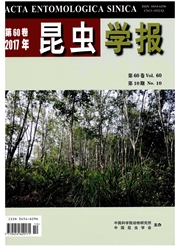

 中文摘要:
中文摘要:
为研究甜菜夜蛾Spodoptera exigua幼虫被斑痣悬茧蜂Meteorus pulchricornis寄生后的取食以及食物利用情况,在室内采用重量法测定了甜菜夜蛾4龄幼虫被寄生后取食量、体重增加量、营养指标的变化。结果表明:被寄生甜菜夜蛾幼虫的取食量、生长率和食物利用效率等明显受到抑制,幼虫被寄生后第3-6d取食量显著小于未被寄生幼虫,寄生后第4d的幼虫取食量只有正常幼虫的29.89%,第5d只有48.69%。幼虫在寄生后的第3-5d体重增加量显著小于未被寄生幼虫,分别为正常幼虫的21.51%,38.87%和14.42%,相对生长率则也显著低于后者。被寄生甜菜夜蛾幼虫的营养利用表现也明显不同于未被寄生幼虫,反映生长和代谢效率的食物利用率(ECI)和食物转化率(ECD)均显著降低,而反映吸收效率的近似消化率(AD)则提高。虽然在寄生后第4d出现了相反的现象,其原因可能在于第4d取食量明显减少,而体重仍在增加。本研究表明,斑痣悬茧蜂寄生明显抑制寄主甜菜夜蛾幼虫的取食、食物利用效率和生长。
 英文摘要:
英文摘要:
The effects of parasitism by the koinobiontic parasitoid Meteorus pulchricornis (Wesmael) on food consumption, weight gain, and food utilization in the penultimate instar larva of Spodoptera exigua Htibner were studied by the gravimetfic method in the laboratory. The results indicated that the parasitism resulted in a significant reduction of the amount of food consumed, the growth rate, and food utilization of the host larva. The parasitized larva consumed less food, which were 29.89 % and 48.69 % of that of the unparasitized on the 4th and 5th day, respectively. In line with the food consumption, the weight gain of the parasitized larva was less than the unparasitized, which were 21.51%, 38.87% and 14.42% of that of the unparasitized on Day 3, 4 and 5 after parasitization, respectively. The relative growth rate of the parasitized larva was significantly lower than the healthy larva from Day 3 to Day 5 after parasitization. The food utilization of the parasitized larva measured with the efficiency of conversion of ingested food (ECI) and the efficiency of conversion of digested food (ECD) for body mass was significantly less than the unparasitized larva, but the approximate digestibility (AD) was increased as expected, while the unexpected phenomenon is that the above pattern was reversed on the 4th day after parasitization. The unexpected changes in nutrition indices on the 4th day after parasitization may be attributed to the effect of much less amount of food consumed by the parasitized larva while gaining more weight at the same time. The study indicates that parasitism of M. pulchricornis obviously inhibits food consumption, food utilization, and growth of its host S. exigua larvae.
 同期刊论文项目
同期刊论文项目
 同项目期刊论文
同项目期刊论文
 Developmental interactions between Spodoptera exigua (Noctuidae, Lepidoptera) and its uniparental en
Developmental interactions between Spodoptera exigua (Noctuidae, Lepidoptera) and its uniparental en Effects of feeding frequency and sugar concentrations on lifetime reproductive success of Meteorus p
Effects of feeding frequency and sugar concentrations on lifetime reproductive success of Meteorus p 期刊信息
期刊信息
